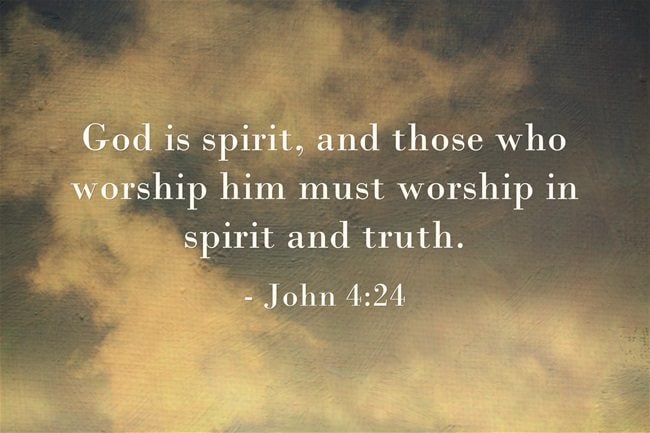Here is a Sunday school lesson or Bible study about worship.
Worship in Spirit and in Truth
John 4:24 “God is spirit, and those who worship him must worship in spirit and truth.”
In John chapter 4, Jesus had been talking to a Samaritan woman, both cultural stigmas of the Jews, but Jesus wasn’t interested in cultural stigmas but more often in shattering them, and that’s just what He did when He talked with the woman at the well, who by drawing water at the heat of the day, showed she was a woman of ill repute (John 4:16-17). She was either confused about true worship or tried to change the subject by saying, “Our fathers worshiped on this mountain, but you say that in Jerusalem is the place where people ought to worship” (John 4:20) so Jesus clarifies it by telling her that “the hour is coming when neither on this mountain nor in Jerusalem will you worship the Father. You worship what you do not know; we worship what we know, for salvation is from the Jews. But the hour is coming, and is now here, when the true worshipers will worship the Father in spirit and truth, for the Father is seeking such people to worship him” (John 4:21-23).
What is true worship in spirit and in truth?
Can you have one without the other?
What hour was it that Jesus said “is coming” (John 4:21)?
Worshiping Creatures
Colossians 2:18 “Let no one disqualify you, insisting on asceticism and worship of angels, going on in detail about visions, puffed up without reason by his sensuous mind.”
I remember watching a TV show about nature and it suddenly struck me that they were actually worshiping the creatures just by the hushed, reverential tones and text they used to describe it. This wasn’t something new because God, in speaking through Jeremiah said, “Do not go after other gods to serve and worship them, or provoke me to anger with the work of your hands. Then I will do you no harm” (Jer 25:6) but this is deep within the heart of man from ancient Egypt to the Apostle Paul’s day, who wrote that they have “exchanged the glory of the immortal God for images resembling mortal man and birds and animals and creeping things” (Rom 1:23) and “exchanged the truth about God for a lie and worshiped and served the creature rather than the Creator, who is blessed forever! Amen” (Rom 1:25). God gave up on them because they gave up on God (Rom 1:24-28) and that is a dangerous place to be (Heb 9:27).
What does it mean “God gave them up to their lusts?
What does it mean “God gave them up to their dishonorable passions?
What does it mean “God gave them up to their debased mind?
Does it seem that some Christians come close to worshiping angels?
Do some people come close to worshiping saints?
Useless Worship
Matthew 15:8-9 “This people honors me with their lips, but their heart is far from me; in vain do they worship me, teaching as doctrines the commandments of men.”
Jesus was giving the Pharisees and the scribes one of the sternest rebukes they had ever received because they had been using their self-righteousness as a way of avoiding taking care of their own parents and breaking the fifth commandment. Jesus said it was “for the sake of your tradition you have made void the word of God. You hypocrites” (Matt 15:6-7) but instead of humbling them, it only served to harden their hearts. King Saul was disqualified from being king for that same reason; he didn’t worship correctly and he also disobeyed God’s command through Samuel the Prophet, so Samuel asks Saul “Has the LORD as great delight in burnt offerings and sacrifices, as in obeying the voice of the LORD? Behold, to obey is better than sacrifice, and to listen than the fat of rams” (1st Sam 16:22). Saul never learned “To do righteousness and justice is more acceptable to the LORD than sacrifice” (Prov 21:3).
What would make it a vain worship of God?
Do some of our traditions interfere with taking care of our parents?
Weren’t the Pharisees and scribes breaking the fifth commandment (Ex 20:12)?
Have you ever broken the fifth commandment?
Worship and Glory
Psalm 22:29 “Ascribe to the Lord the glory due his name; worship the Lord in the splendor of holiness.”
The word most often used in the Old Testament for worship is the Hebrew word “shachah” (Gen 22:5) and means “to bow down, to depress, and to prostrate oneself.” That is the way many of the Old Testament patriarchs prayed and we find this also in the New Testament where the Geek word for worship is “proskyneo” (Matt 2:11) and means “kiss the hand towards the one” or “in token of reverence” so taking both together, biblical worship can be to bow down to the ground and lay flat (prostrate) and give God reverence (deep respect), respect, and praise, for He is the glorious God. To ascribe something to someone is to impute or assign credit to, so we are to ascribe to God the glory that is due Him.
How can you ascribe glory to God?
Do you glorify God in your body (1st Cor 6:20)?
What position do you worship God in?
Is it the same position that you pray in?
The Greatest Worship Services
Revelation 14:7 “Fear God and give him glory, because the hour of his judgment has come, and worship him who made heaven and earth, the sea and the springs of water.”
The seemingly rhetorical question is stated, “Who will not fear, O Lord, and glorify your name? For you alone are holy. All nations will come and worship you, for your righteous acts have been revealed” (Rev 15:4), and for now, the answer is no. Only a small remnant worships God right now but in time, “No longer will there be anything accursed, but the throne of God and of the Lamb will be in it, and his servants will worship him” (Rev 22:3) but only if you decide today to repent and trust in Christ. Only then can you “Worship God” (Rev 22:9c). That great day is coming when you and I will see God face to face for the very first time, as Lord and Master (Rev 21:3; 22:4), but if not, you’ll face Him as Judge and Executioner (Rev 20:12-15). Either way, you will bow down because “God has highly exalted him and bestowed on him the name that is above every name, so that at the name of Jesus every knee should bow, in heaven and on earth and under the earth, and every tongue confess that Jesus Christ is Lord, to the glory of God the Father” (Phil 2:9-11).
Is there another chance to be saved, like in the tribulation (2 Cor 6:2)?
Will “every tongue” mean the lost?
Are there any unbelievers after death?
Conclusion
I urge you in your study to look at all of the Bible verses and read them aloud in the class so that you can get the most out of this lesson on worship because someday, “All the nations you have made shall come and worship before you, O Lord, and shall glorify your name” (Psalm 86:9) so “let us worship and bow down; let us kneel before the Lord, our Maker” (Psalm 95:6). The main point of this lesson is to “Exalt the Lord our God; worship at his footstool! Holy is he” (Psalm 99:5) for God “will gather all nations and peoples together, and they will see my glory” (Isaiah 66:18). At that time, there will be “a great multitude that no one could number, from every nation, from all tribes and peoples and languages, standing before the throne and before the Lamb, clothed in white robes, with palm branches in their hands and crying out with a loud voice, “Salvation belongs to our God who sits on the throne, and to the Lamb” (Rev 7:9-10)!
What must that be like to experience the whole earth coming to worship God?
Can you imagine the praise?
What is the purpose of worshiping God in Psalm 86:9?
What has changed in your understanding of worship in this study?
Article by Jack Wellman
Jack Wellman is Pastor of the Mulvane Brethren Church in Mulvane Kansas. Jack is also the Senior Writer at What Christians Want To Know whose mission is to equip, encourage, and energize Christians and to address questions about the believer’s daily walk with God and the Bible. You can follow Jack on Google Plus or check out his book Teaching Children the Gospel available on Amazon.












